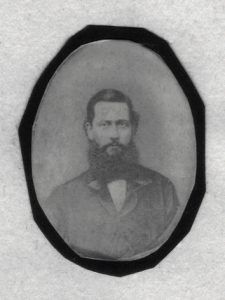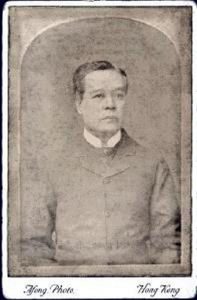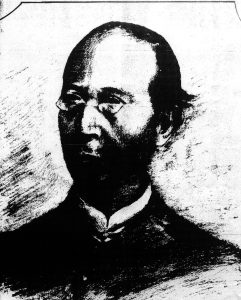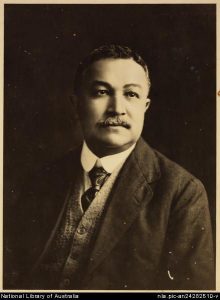This is the next article on the Macanese community of Hong Kong. The Portuguese translation was published in the JTM on Nov. 17.
Over the Bamboo Ceiling
The social ordering of Hong Kong society had lasting effects on the first generation of Macanese settlers. Into a European population of less than 1,000 in the 1850s, young men were recruited from parochial schools in Macau to jobs in Hong Kong’s government, trading houses, and banks.[1] Colonial directories in 1849 and 1850 listed 406 Macanese workers, the majority working in private enterprise. Virtually all occupied mid-level positions below English supervisors and above Chinese shrofts, compradores, and laborers.[2] Macanese who worked in government also found they could rise only so high, but no higher, in the ranks. These institutional limits, however, did not prevent some from pursing other ventures.
Early Successes
 Leonardo d’Almada e Castro, Chief Clerk of the Secretary of Trade, was one such example. During the course of his career, d’Almada rose quickly from second clerk in Macau before the move to Hong Kong, to “Keeper of the Records” (Head Archivist) in 1844, then to Chief Clerk in the Colonial Office in 1846. But less well known is d’Almada’s career as a property owner and philanthropist.[3] His position in the Secretary of Trade’s office not only placed him in charge of all Portuguese workers, but also gave him access to information on the sale of land near Hong Kong’s deep water harbor. These lots were highly valued by traders wishing to relocate from Macau and other treaty ports.
Leonardo d’Almada e Castro, Chief Clerk of the Secretary of Trade, was one such example. During the course of his career, d’Almada rose quickly from second clerk in Macau before the move to Hong Kong, to “Keeper of the Records” (Head Archivist) in 1844, then to Chief Clerk in the Colonial Office in 1846. But less well known is d’Almada’s career as a property owner and philanthropist.[3] His position in the Secretary of Trade’s office not only placed him in charge of all Portuguese workers, but also gave him access to information on the sale of land near Hong Kong’s deep water harbor. These lots were highly valued by traders wishing to relocate from Macau and other treaty ports.
D’Almada was particularly active in 1860, during which he sold fifteen (15) lots in Showkewan and seven (7) more in Aberdeen in 1861.[4] In later years, he retained ownership of private residences to accommodate the growing number of Portuguese workers who came to Hong Kong for work. From 1864 through 1866, for example, d’Almada placed advertisements for at least eight (8) different houses, some with “a detached two story granite godwon” to facilitate access to the docks and shipping. Reflecting the times, d’Almada also owned homes in Macau, but had difficulty renting them. In1867 several ads by him appeared showing properties with reduced rents, suggesting that there was lower demand due to a dwindling number of traders who had yet to move to Hong Kong.[5]
Leonardo d’Almada’s ownership of property allowed his philanthropy to flourish. J.P. Braga writes that in the 1870s d’Almada deeded land and a building on Caine Road to the Italian Canossian sisters for an orphanage and a school. Other members of the d’Almada family made contributions as well. His brother, Jose d’Almada, private secretary to Governor Sir John Pope Hennessey, added to the land in the 1880s, allowing the sisters to maintain a presence in Hong Kong throughout the 20th century. Leonardo’s oldest daughter, Carolina, took the veil of the Canossian Sisters of Charity in 1878 and remained in the order until her death at age 90 in 1938.[6]
Accusations and the Bamboo Ceiling
Despite these contributions, d’Almada was plagued by spurious criticisms of his position in government. As early as 1847 in a “Letter of an Englishman” printed in the China Mail, objections were raised about d’Almada’s appointment as Chief Clerk in the Colonial Office the previous year because a brother and a cousin also worked under him. The suggestion of nepotism was easily refuted by the government’s own policy placing all Portuguese workers in the Colonial Office under the Chief Clerk. The same writer also accused d’Almada, a devout Catholic, of being an “Agent of the Propagandists”, claiming that he could neither write nor read English, and must apply to Rome for permission to rent his properties.[7]
Such accusations against a man who would spend four decades in government service could have been disregarded had it not been for another incident in the 1850s that was revealed many years later. Just before leaving his post in 1882, Governor John Pope Hennessey disclosed that one of his predecessors, Sir John Bowring, had ignored an order from the Colonial Office in London to appoint Leonardo d’Almada as Colonial Secretary of Hong Kong, the second highest position in the colony. Bowring failed to make the appointment due to local objections that d’Almada, a Portuguese citizen of Macau, was not a British subject and should not be in a position of authority over “native-born” Englishmen.[8]
 Similar objections were made of other Macanese workers. Januario de Carvalho, Chief Cashier of the Treasury Office and Jose Pedro Braga’s early mentor, had been appointed in 1878 as Acting Colonial Treasurer. But his appointment was revoked because Carvalho was an “alien” citizen of Macau and not allowed to swear allegiance to Britain.[9] Joao Hyndman, an assistant in the Diplomatic Department, was also denied promotion because he retained Portuguese citizenship as the son of a mother born in Macau.[10] Alexandre Grand Pre’, an officer in the Hong Kong Police Force, culminated a career in the turbulent environment of the colony with an appointment to Superintendent of Police in 1855.[11] That appointment also was rescinded by the Police Commission based on criticism from senior British officers who objected to Grand Pre’s “alien” ancestry (French and Portuguese).[12]
Similar objections were made of other Macanese workers. Januario de Carvalho, Chief Cashier of the Treasury Office and Jose Pedro Braga’s early mentor, had been appointed in 1878 as Acting Colonial Treasurer. But his appointment was revoked because Carvalho was an “alien” citizen of Macau and not allowed to swear allegiance to Britain.[9] Joao Hyndman, an assistant in the Diplomatic Department, was also denied promotion because he retained Portuguese citizenship as the son of a mother born in Macau.[10] Alexandre Grand Pre’, an officer in the Hong Kong Police Force, culminated a career in the turbulent environment of the colony with an appointment to Superintendent of Police in 1855.[11] That appointment also was rescinded by the Police Commission based on criticism from senior British officers who objected to Grand Pre’s “alien” ancestry (French and Portuguese).[12]
These incidents were not isolated, and apparently part of an institutional pattern that had political and economic overtones. Between 1862 and 1941 the top ranks of the British colonial civil service were chosen from a small group of Oxford and Cambridge trained English “cadet officers”.[13] Most served in several colonial ports during their careers, and spoke multiple languages. They were often assigned to lead government departments in service of commercial trade. According to historian H.J. Lethbridge, three future cadets became Hong Kong governors, five others were high commissioners, and four more were chosen Colonial Secretary. The successors to Grand Pre’, Hyndman, Carvalho, and d’Almada all came from the cadet list.[14]
The hiring of Portuguese as department heads, on the other hand, would have broken long held policies that required non-English workers to be paid less than their British counterparts. For example, in a review of public officer salaries by the governor, a typical Portuguese worker’s pay between 1856 and 1889 was over 60% less than that of a mid-level English supervisor.[15] Legislative Council minutes in 1906 also indicated that during a recent budgetary shortfall caused by higher exchange rates, Portuguese workers were routinely preferred because they could be paid less than English workers who were similarly trained.[16] Portuguese workers were deemed to be more dependable in most cases. Internal memoranda indicated that English workers tended to stay in Hong Kong only a few years, some accused of resorting to petty crime and “consorting” with other races. In fact, many Englishmen were unable to endure the climate, social attitudes, and ethnic tensions of the colony in its early years.[17]
Defying Conventions
 There was one Macanese pioneer, however, who seemed to defy the conventions of work in Hong Kong. Delfino Noronha was that most unusual of Portuguese men who staked out his own personal claim to success. Rather than work as a clerk or linguist as a most Macanese had done, Noronha, who was trained as a compositor, set up his own printing plant in 1842 at the age of nineteen. After two years Noronha opened his first business, Noronha & Co. By 1849 his company was granted the contract to print the Hongkong Government Gazette, the colonial government’s official record and its principal means of communication.[18] It was from this vantage point that Noronha become an important link between the government for which he worked and the Macanese community he now led.
There was one Macanese pioneer, however, who seemed to defy the conventions of work in Hong Kong. Delfino Noronha was that most unusual of Portuguese men who staked out his own personal claim to success. Rather than work as a clerk or linguist as a most Macanese had done, Noronha, who was trained as a compositor, set up his own printing plant in 1842 at the age of nineteen. After two years Noronha opened his first business, Noronha & Co. By 1849 his company was granted the contract to print the Hongkong Government Gazette, the colonial government’s official record and its principal means of communication.[18] It was from this vantage point that Noronha become an important link between the government for which he worked and the Macanese community he now led.
As the first Portuguese to establish a commercial enterprise independent of the British (although they remained clients), Noronha was in a position to hire many skilled workers from his old school, St. Joseph’s in Macau. In the early years, both he and his wife set up the print themselves for the most important books and reports produced by the press. Many included editions in multiple languages. These attracted the attention of an international audience, including Church leaders, ambassadors, governors, Colonial Secretaries, wealthy merchants, and at least one revolutionary leader who were visitors to Noronha’s home. Delfino’s grandson, Jose Pedro Braga, recalled an especially eventful dinner with Jose Rizal, a Filipino nationalist, on his last visit to Hong Kong in December 1896, just before his assassination by the Spanish in Manila. Noronha was held in such high esteem that one Hong Kong governor envisioned Noronha & Co. would remain the colony’s printer “in perpetuum”.[19]
Noronha’s achievements went beyond his success as a printer. His example in business and willingness to help others, including many outside the Portuguese community, ushered in a period of independent enterprise among the Macanese that would continue for the next century in Hong Kong. By 1861 a local business directory already listed thirteen businesses owned by members of the community, including pharmacies, merchant houses, a soda water firm, and a shipping company.[20] Each of the three major newspapers in Hong Kong were also staffed exclusively by Portuguese compositors, most trained at St. Joseph’s in Macau.
Like Leonardo d’Almada, Noronha was an early landowner on Hong Kong Island, and one of the first investors in Kowloon. In the 1870s he became a partner with another Macanese immigrant, Marcus Calisto do Rozário, on ten acres in Tsim Sha Tsui. In the process, Noronha became a noted horticulturist, experimenting with various tropical plants and fruits on his Kowloon farms. During the same period, Noronha operated an irregular steam ship service between Hong Kong and Kowloon, the precursor of the “Star Ferry” that operates over the same route today.[21]
 While Noronha’s influence in Hong Kong was great, his most lasting impression was made on his grandson, Jose Pedro Braga. Almost from birth, the young Braga was exposed to a wide range of political and cultural ideas raised by his grandfather’s activities, and from the opinions of many guests who dined at Noronha’s table. Many years after his grandfather’s death in 1900, Braga credited those influences on his own career, providing perhaps a fitting epitaph for the first generation of Macanese in Hong Kong.
While Noronha’s influence in Hong Kong was great, his most lasting impression was made on his grandson, Jose Pedro Braga. Almost from birth, the young Braga was exposed to a wide range of political and cultural ideas raised by his grandfather’s activities, and from the opinions of many guests who dined at Noronha’s table. Many years after his grandfather’s death in 1900, Braga credited those influences on his own career, providing perhaps a fitting epitaph for the first generation of Macanese in Hong Kong.
“By dint of hard work and thrift, and in spite of the ravages of the climate and other handicaps of life in Hongkong‘s early days, Mr. Delfino Noronha brought up a large family of children and grandchildren and built up a prosperous business. … He was small and slight, and was always immaculately dress, and he was my ideal of a perfect gentleman.”[22]
Notes
[1] “Census of Hongkong 31st December, 1853”, the Hongkong Government Gazette (HGG)
[2] H.J. Lethbridge, “Caste, Class and Race in Hong Kong before the Japanese Occupation, in M. Topley (ed.) Hong Kong: the Interaction of Tradition and Life in the Towns, University of Hong Kong Press, 1975
[3] J.P. Braga, The Portuguese in Hongkong and China, HKU Press, 1946 (BPHKC)
[4] Jorge Pereira Forjaz Collection, Old China Hands Archive, CSU Northridge, JPF 2,4,5,14,15,16,22,26,and 27. (JPF)
[5] JPF, ibid
[6] BPHKC, p. 129
[7] JPF, ibid
[8] BPHKC, p. 132
[9] BPHKC, p. 204. Cavalho eventually petitioned for and was granted British citizenship in 1885.
[10] BPHKC, p. 128.
[11] BPHKC, p. 125.
[12] JPF, ibid
[13] H.J. Lethbridge, “Hong Kong Cadets: 1862-1941”, Journal of the Royal Asiatic Society, vol. 10, 1970, (HJL)
[14] HJL, ibid
[15] “Salaries of Public Officers”, Report of the Commission appointed by Governor Sir. G. William Des Voeux, 13 December, 1889, Appendix I, 321-323 (SPO)
[16] “Budget Notices for 1906” by A.M. Thomson, Colonial Treasurer, HK Legislative Council Minutes, 13 September, 1906 (BN)
[17] SPO, ibid
[18] BPHKC, p. 125 – 204
[19] BPHKC, ibid
[20] BPHKC, ibid
[21] BPHKC, ibid
[22] BPHKC, ibid
More Stories
Studies of China’s GBA: U.S. – Chinese Interdependence after the Pandemic
Colonial Journalism in 19th Century Macau and Hong Kong
Women and Cultural Boundaries in Macau